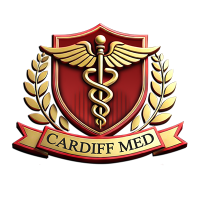Paediatrics and Child Health MSc
The preventative focus, coverage of a wide range of disorders from the prenatal period to adolescence and inclusion of the global child health module, make the paediatrics online courses distinctive and provide the learner with a broad clinical overview of the practise of paediatric medicine.
Overview
While paediatric specialists are in short supply in developed nations like the UK, they are even more scarce in developing nations that are experiencing severe healthcare shortages. While raising awareness of the problem will be helpful, improving access to postgraduate paediatric education is the only way to truly impact child health outcomes on a global scale.
Our part-time, online MSc in paediatrics will broaden your knowledge of current issues that are especially important for practising paediatric medicine in the 21st century. From the perinatal period up to adolescence, the quick-to-complete programme will provide you with a thorough understanding of paediatric medicine, covering a wide range of conditions and presentations. Our fast-paced programme uses scenario-based discussion forums to actively engage you, providing insights into real-world implementation strategies and why certain approaches are chosen over others.
Entry Requirements
Since our paediatrics courses are conducted entirely online, they are accessible to both UK and international registered healthcare professionals.
Applicants will typically hold a first degree or equivalent (including international qualifications) in a relevant professional healthcare field, such as a medical or nursing degree.
Registered healthcare professionals without these recognised qualifications will be considered for the Child Health and Paediatrics MSc on an individual basis, and a wide range of prior experience may be taken into account. In some cases, applicants may be asked to submit a piece of work for assessment to confirm that they can work comfortably at a postgraduate level and demonstrate the requisite clinical and professional knowledge.
- A copy of your updated CV including your address and date of birth.
- A copy of your undergraduate degree certificate.
- The name and email address of someone who is able to provide a reference, this can be a work colleague, employer or former tutor.
- A detailed personal statement explaining why you would like to undertake the course.
- A copy of your proof of English competency (see below).
Proficiency in the English language is also essential to completing our courses. If English is NOT your first language, we ask for proof of competency during the application process. We are able to accept an IELTS overall score of 6.5 (with a minimum of 6.0 for each band) or an equivalent qualification.
If you do not meet these requirements, please don’t worry. You can also contact our admissions team on admissions@cardiffmed.com for more information on the qualifications we accept.
Key Facts
- Awarding University
- Starting Date: 1st September 2025
- Application Deadline : 29th August 2025
- Class Size : 15 - 20
- Duration : 24 months
- Commitment : Part-time
- Format : 100% Online
Course Fees
- Deposit for September 2025: £415 †
- Total Course Fees for UK & International Students for September 2025: £8,880 ††
Payment Options
- Option 1: Upfront Payment in full. Pay-in-full discount is available.
- Option 2: Apply for Interest-free payments each month for the duration of the course.
Payment Plan Breakdown
First Year Payments
| Deposit | 10 Monthly Payments | Final Payment |
| £415 † | £415 | £415 |
Total first year payments: £4,980
Second Year Payments
| 11 Monthly Payments | Final Payment |
| £325 | £325 |
Total second year payments: £3,900
You may also be interested in:
- Spread the cost with Lendwise, who offer financing options for up to 8 years. ††††
† Deposits are non-refundable
†† Prices are subject to review following each intake
†††† Subject to eligibility criteria.
Course Modules and Learning Outcomes
The online Paediatrics and Child Health MSc is a two-year course consisting of eight modules (180 credits), with the first 120 credits deriving from the Postgraduate Diploma.
Year 1
Module Aims
Equip the individual with a systematic understanding of general paediatrics, and application of knowledge for direct patient benefit/service development and future study.
Module Content
- Genetic testing and counselling
- Maternal risk factors on newborn
- Resuscitation and examination
- Screening
- Monitor growth and development and learn management in infancy and primary care settting
Learning Outcomes
- Demonstrate a comprehensive understanding of; antenatal testing, maternal history taking, neonatal resuscitation, national screening programme, 0-5 years child health surveillance, neonatal common presentations.
- Critically Apply an in-depth knowledge of health promotion strategies into their practice as General Paediatrician.
Module Aims
To recognise the importance of immunisation in preventing communicable disease and thus reduction in mortality and morbidity.
Module Content
- Preventing communicable disease and reduction in mortality and morbidity
- Modify risk factors e.g obesity and asthma
- Prevent development of chronic diseases
- Appropriate diet and nutritional management
- Increasing incidences of allergic disorders in childhood
Learning Outcomes
- Demonstrate a comprehensive understanding of; national immunisation programme, modifiable risk factors in chronic diseases, healthy lifestyle choices, childhood nutrition, vitamin and mineral deficiency diseases, common childhood allergic disorders.
- To justify the rationale of universal immunisation to prevent communicable diseases in childhood.
Module Aims
To be able to apply evidence based practice in diagnosing and managing common childhood presentations in primary and secondary care settings.
Module Content
- Childhood rashes
- Child presenting with fever
- Child presenting with a recent onset limp
- Child with first seizure and chronic cough
- Precocious puberty
Learning Outcomes
- Demonstrate a comprehensive knowledge and understanding to apply evidence based diagnostic and management pathway for a child presenting with rash in primary or secondary care setting.
- To evaluate practice critically in relation to the evidence base in child health and general paediatrics.
Module Aims
To learn about the application of evidence based medicine in managing common paediatric emergencies.
Module Content
This module will cover a range of common presentations such as; paediatric basic and advanced life support, acute asthma, status asthmaticus, status epilepticus, altered consciousness, head trauma, encephalopathy, non-accidental injury, diabetic keto-acidosis, acute abdominal pain, child abuse, child safeguarding procedures.
Learning Outcomes
- Demonstrate a comprehensive knowledge and understanding in the delivery and advancement of paediatric-related care.
- Equip students with life-long learning and advanced problem-solving skills that they can apply to practice in general paediatrics.
Module Aims
To learn about the presentation, diagnosis and management of children with developmental disorders. To learn about the support needs and current support availability for children with developmental disorders.
Module Content
- This module will provide an overview of the diagnosis and treatment of; chromosomal syndromes, inherited disorders, metabolic syndromes and ex-preterm and developmental disorders.
- This module will also cover an overview of; mental health disorders, substance abuse, domestic, social and environmental factors and how to prevent these.
Learning Outcomes
- Demonstrate a comprehensive understanding of a range of common primary care presentations in mental health.
- Critically evaluate a variety of methods used to support an inclusive environment in the community.
- Critically apply problem-solving skills that they can apply to practice in general paediatrics.
You will develop a critical awareness of infertility treatments currently available, and an awareness of the ethical dilemmas surrounding assisted reproduction and broadly how it relates to different political and religious sensitivities.
Year 2
To prepare students for an independent research-based project by developing skills in selecting, appraising, discriminating, using evidence and appropriate research/investigative methods to address relevant topics for investigation. The professional project module provides students with an opportunity to complete an important, substantial and potentially publishable study of their own choosing.
Module Content
- Quantitative Studies
- Statistical Analysis Interpretation
- Interpreting the Evidence
- Meta-analysis and Systematic Reviews
- Qualitative Studies
- Evidence Appraisal: Interpreting, Weighing and Synthesising the Evidence
- Audit, Governance and Quality Improvement, Health Economics
- Preparing a Research Proposal: Research Committees, Consent, Ethics, Probity and Literature Review
Following the research methods, students will submit a professional project proposal for their chosen topic, this includes a proposal form and ethics application. Students are given a 4-week period after the research methods to complete this.
Students will then create a piece of work based upon a specific subject-related project relevant to the student’s practice. The students will have a further 24-weeks to complete this. This project may comprise:
- Systematic literature review and appraisal of the evidence
- Audit of non-patient data/organisational audit
- Review and implementation of evidence-based practice
- Literature review and qualitative or quantitative research proposal
- Case(s)-based and quality of service review with critical appraisal
- Case report, review of literature and organisational assessment
- Secondary data analysis
Programme Leader
The hospital plays a statewide services includes the Acquired

Dr Ambalika Das
Consultant Neonatologist
Dr Ambalika Das
Current Post: Consultant Neonatologist
Dr Ambalika Das currently holds the position of Consultant Neonatologist, having worked in paediatrics and child health for over 25 years. An interest in teaching and training, Dr. Das has been teaching medical students, nursing students, advanced nursing practitioners, midwives, GP and paediatric trainees over many years.
As a neonatologist Dr. Das is fascinated by perinatal medicine, and within this particular programme she is most excited about the Global Child Health module.
Assessment Methods
This programme emphasises learning through active participation in case-based discussions, reflection, and real-life scenarios. Students engage with clinical cases that mirror everyday practice, fostering problem-solving and evidence-based application from the very beginning.
Across the modules, assessments are integrated with learning. Each week, you will work through two to three clinical cases, discussing and reflecting on them with peers under the guidance of an expert tutor. These discussions form the core of your learning and are also the basis for your assessments.
Our innovative teaching methods are designed to help you translate this learning into real-world clinical practice. You’ll need to regularly log in to participate in discussions, ideally daily, and commit approximately two hours per day to your studies. Our dedicated Student Support Team is available to assist with any challenges you may encounter, from navigating our online platform to managing deadlines.
How Foundational Knowledge is Developed
The programme is structured so that foundational knowledge is introduced through carefully designed clinical cases. Each case is crafted to highlight essential concepts and progressively deepen your understanding as you apply critical thinking and evidence-based analysis. This hands-on approach ensures that you are not only acquiring theoretical knowledge but also learning how to apply it in a practical, clinical setting.
This programme is suited for professionals who thrive in an online, discussion-based learning environment. Please note that this course focuses on interactive, applied learning through peer collaboration and case discussions. You will be fully supported, encouraged, and led through the programme to success and graduation!
- Case problems reflective of day-to-day practice/research will be presented for the students to consider and answer every week.
- Students discuss the concepts being presented in the case within their online group discussion forum, facilitated throughout the module by their tutor and marked by them at the end of the module.
- The content of the academic forum is based on the learning outcomes for the module.
This can be either a Group Activity or an Individual Activity:
Group activity
Designed to stimulate and test the students’ ability to work as a team in taking the subject area forward. A group task is set, the group elects a leader using the online forum and the leader allocates tasks to group members. The leader is responsible for managing, collating and submitting the activity (online) at the end of the module. The tutor provides formative guidance part way through the module and marks the assessment at the end.
Individual activity
Designed to stimulate and demonstrate personalised learning, creativity and problem solving with application to each student’s own practice area.
Examples of individual activities might include either a written assignment, developing an academic poster presentation, a blog or social media project.
All students must complete the same assignment for each module which is pre-determined by the Programme Leader before the modules commence.
The online reflective journal is a learning portfolio that requires students to record and critically reflect on their learning. Reflection is an important aspect of the programme since the professionals will be able to spend time considering how their practice compares to the themes being discussed in the module. The tutor provides feedback to the student weekly and marks it at the end of the module. Reflective practice is a requirement for healthcare professionals for professional re-validation and professional development.
- Case problems in the form of a one-hour timed examination with multiple-choice questions directly test the reasoning and knowledge objectives of the module.
- The online exam is marked automatically.
- The examination tests related theory and problem-solving skills.
Why Study a Paediatrics and Child Health Master's with CardiffMED
100% Flexible
Our courses are 100% online. No fixed study times mean you can log in and learn whenever and wherever.
Multidisciplinary – study in a group of doctors, nurses, pharmacists and other healthcare professionals.

Career Boosting
Get a University-validated postgraduate qualification in just 1 calendar year instead of 2 academic years.
40% of our alumni reported a salary increase 2 years after studying with us.

Expert Led
All of our programmes are authored and developed by world-leading experts in their field.
Our faculty are selected due to their subject expertise, experience and teaching abilities to ensure the highest standards of educational excellence.

The Paediatrics and Child Health Postgraduate Diploma is applicable to all GPs, Practice Nurses, Specialist Nurses and Pharmacists.
You'll learn through our flexible, interactive online platform, which allows you to engage with clinical cases, complete assignments, and collaborate with fellow students at times that suit your schedule. There's no fixed timetable—simply log in daily to participate in the week's activities.
Our teaching approach is highly interactive, using small groups of 10-20 students to foster a collaborative environment where you can engage in thoughtful discussions and receive guidance from your tutor. You'll have access to learning resources and discussion forums that encourage ongoing interaction and deeper engagement with the material.
Throughout your studies, you'll receive support from a dedicated expert tutor and our Student Support Team, ensuring you have the resources needed to navigate the course successfully.
Why Enroll in This Program
MSc Paediatrics & Child Health Program
CardiffMED offers MSc Paediatrics and Child Health, a specialized program offering advanced training in child healthcare with outpatient and inpatient services. It provides expert-led world-class learning.





